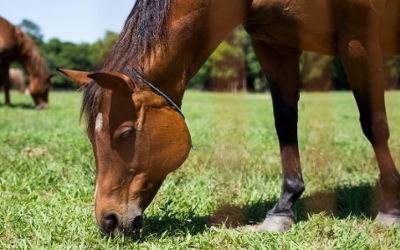By Nick Simmons
Horses have been used for farm work, as a form of recreation, and exhibition for many years. They come in many sizes, colors shapes and temperaments. One of the most common issues that can affect a horse’s overall performance can’t be seen from the outside. Internal parasites are a primary cause of a horse’s poor performance, decreased overall health and even death. Internal parasites are often silent offenders that can be robing your horse of nutrients and basic functions of their digestive system. There are over 150 species of parasites that can affect the horse, they too come in many sizes and shapes. The most common internal parasites include small strongyles, ascarids (roundworms), tape worms, large strongyles, pinworms, lungworms, bots and threadworms.
Although the parasites themselves can’t be seen from the outside, clinical signs can become more visible after a threshold level of exposure has been established, and their affect on the horses metabolism and well being becomes evident. Some common clinical signs of internal parasites can include dull/rough hair coat, loss of body condition, poor performance, unthriftiness, lethargic/depressed, colic, diarrhea, and pot belly (mainly in young horses.) You may also notice a horse who is uncomfortable and spends time rolling or kicking at their stomach. Fecal Egg Counts (FEC) can be used to determine infection, and the type and kind of internal parasites that horses have been exposed to. This analysis is performed with the assistance of your equine veterinarian.
Anthelmintic drugs are the recommended treatment for internal parasites. There are a number of inexpensive options for horse owners, however in recent years there has been evidence of resistance to anthelmintic drugs within parasite groups. Common causes of resistance include incorrect use of anthelmintic drugs, environmental factors, and host factors. Since these compounds share similar modes of action, and have been used indiscriminately for many years, there has been widespread development of drug resistance. There are no new anthelimintics in the pipeline to offset this risk. Strategies in environmental management and alternative therapies will become more important as horse owners look for new answers. For many years, the common practice for deworming horses was to simply rotate the products used, but studies have shown that this is not the preferred method of parasite control. It’s imperative that we understand how different parasites react to different products.

Adult horses grazing in a pasture at the Horse Teaching Unit.
Let’s look more closely at a few of the most common internal parasites:
Ascarids (Round worms)
These internal parasites most often affect young weanlings or young adult horses who are continuing to develop their immunity system to parasites. Round worms can affect foals and are prone to cause colic.
Sensitive to: Resistance:
Fenbendazole Ivermectin
Pyrantal Moxidectin
Small Strogyles
These parasites affect adult horse in various ways. Clinical symptoms include colic, diarrhea, Ill-thrift and loss of body condition.
Sensitive to: Resistance:
Ivermectin (best) Fenbendazole
Moxidectin Pyrantal
- Deworm monthly beginning at 2 months of age
- Target Ascarids
- Utilize Fenbendazole, Pyrantel
- FEC are not recommended
Click here to see more...